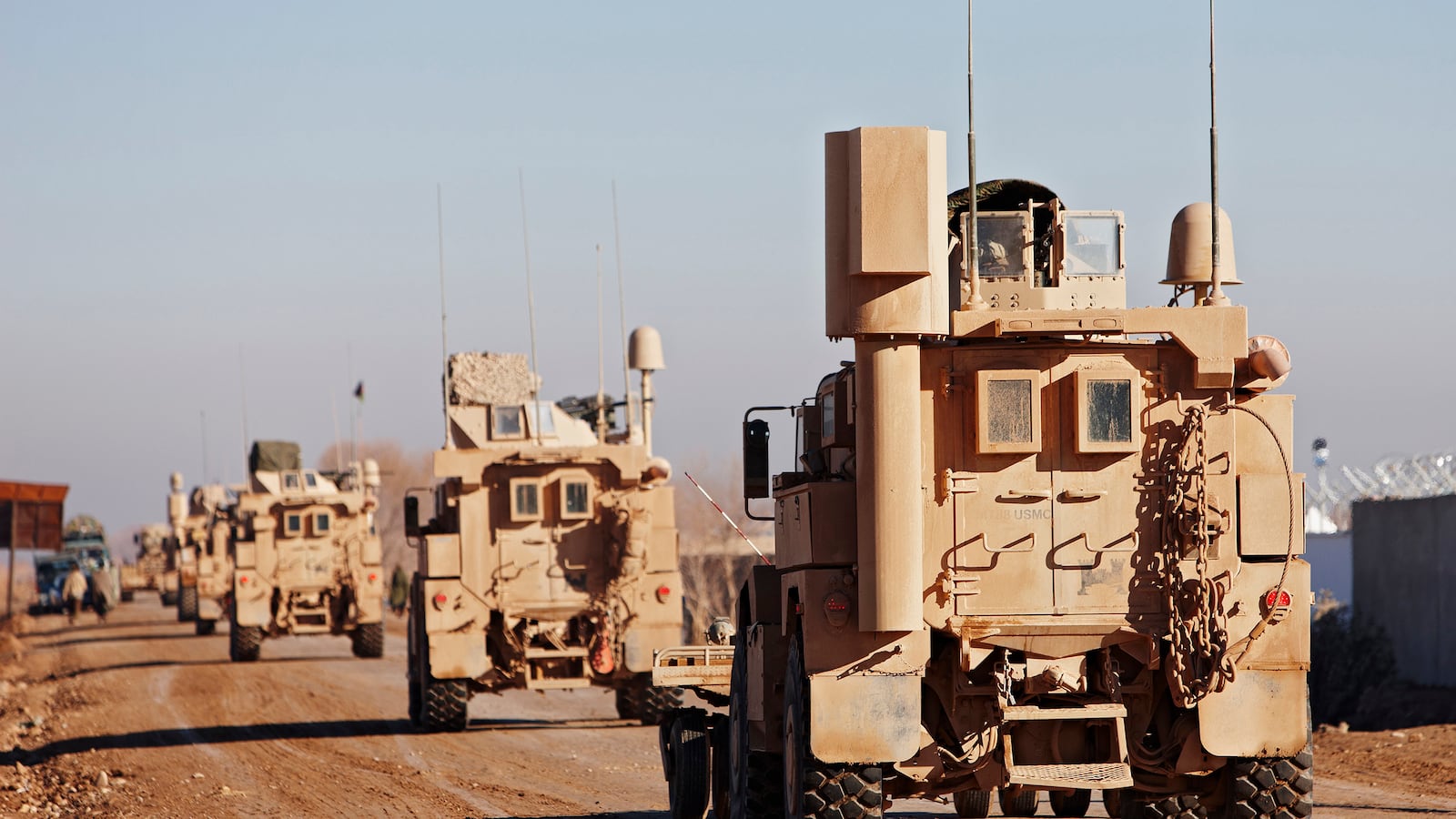Future Iraq and Afghanistan war writers despair: Michael Pitre has already identified the quintessential tagline of this conflict and commandeered it for the title of his first novel, Fives and Twenty-Fives. Like “duck and cover” or “hearts and minds,” the phrase “fives and twenty-fives” captures something essential about the particular era that spawned it, distilling its particular challenges and absurdities into one stock slogan that trips off the tongue.
The phrase may be new to the general public, but every Joe that has stepped outside the wire over the last dozen years knows the order well. When an armored truck convoy stops, the patrol leader will give the command “fives and twenty-fives” over the radio. It is a call to make the convoy safe, by first scanning through the armored glass to spot any roadside bombs that might be five meters away, then dismounting and in a rehearsed combat drill sweeping out on foot to twenty-five meters to find other hidden devices, sometimes by stepping on them.
Pitre’s novel considers both views, how the war looks up close and how it appears from farther away, in Iraq’s Anbar Province and from supposedly safer environs at home. He tells the story through three first-person narrators—a Marine officer, a Navy corpsman medic, and their Iraqi translator—mixing their past and present to mark a continuing stream of fives and twenty-five meter sweeps of memory and daily life.
Peter Donovan is a combat engineer lieutenant who runs a road repair platoon, and Lester Pleasant is the unit’s medic. Frequent readers of contemporary war fiction will recognize the types, Donovan the lost officer who won a medal he feels he doesn’t deserve, Pleasant the poor enlisted man from a tough upbringing who gets kicked out of the military for stealing. Back home in New Orleans, Donovan is reticent and Pleasant is reflective, but neither man fit in.
Life in Iraq was not much better. While Donovan and his engineers never actually find any improvised explosive devices (IEDs) during their fives-and-twenty-fives, they do find plenty of bombs in the craters they need to fill. One hundred fifty seven out of one hundred fifty seven such potholes bear a device at one point early in the book, and if that ratio strains reality, even in Ramadi in 2006, it does point to the danger of simple reconstruction work in a war that was often fought along highways through open desert.
Pitre’s prose is accessible and fast-paced. Sprinkled among the standard veteran tropes—the bar fights and fireworks-induced flashbacks—he finds moments that seem genuinely true: a Marine who tap-dances during mortar attacks to relieve the tension, elaborate murals of penises in the latrine, a college professor who presses Donovan to speak in front of the class because “You’re using your veterans benefits to pay tuition, correct? Then, as taxpayers, I believe your classmates are entitled to the benefit of your experience.”
The most arresting sections, however, are told from the perspective of the third narrator, Kateb (codenamed “Dodge” by the Americans), a young Iraqi interpreter who loves heavy metal music and Huckleberry Finn. Readers have seen precious few glimpses of the Iraqis themselves in contemporary war fiction (Redeployment and The Yellow Birds also included an interpreter as a familiar bridge to a foreign culture). But Dodge is no minor character, he is fully one-third of the book, and through him Pitre provides the most expansive view of Iraqis yet by any veteran writer in mainstream commercial fiction.
Dodge was born into a well-connected family and learned English at a university, but as the book opens he is attempting to escape Baghdad and the war. Dodge’s flight up the Euphrates loosely parallels Huck’s adventures down the Mississippi, with two entrepreneurial friends standing in for the duke and the king, Sunnis and Shia for the Grangerfords and Shepherdsons, and his insurgent-sympathizer father for Huck’s pap.
Dodge is writing a thesis on Huckleberry Finn, and his analysis and conversations with his professor provide an interesting opportunity, a chance for Westerners to reinterpret ourselves and our own history and even our modern geopolitics through the lens of a foreign culture’s read of our own great works. This full-circle comparative literature process is well represented in modern war writing and recent Arabic fiction. Hassan Blasim, author of the fascinating short story collection The Corpse Exhibition, owes an explicit debt to Kafka and Carlos Fuentes. Joydeep Roy-Bhattacharya, an Indian writer living in the United States, pulls from Antigone in The Watch, his novel of the Afghan war. And The Long Way Back, the 1980 novel by Iraqi writer Fuad al-Takarli, is clearly influenced by William Faulkner.
So how do we look when our own light is shined back at us?
“What the American reader knew then, what Americans today do not remember,” Dodge’s professor says, referring to Huckleberry Finn, “these were not just boys making silly plans in caves. Ten years after … their civil war fell upon them. These boys, these Missouri boys, they would have cut each other’s throats in that war. Have you thought about Huck Finn cutting Tom Sawyer’s throat?”
Unfortunately, this degree of visceral insight is not maintained to the end. The book builds to a foreshadowed incident that defines the combat tour of our three narrators and provides context for their mixed homecomings. In this penultimate Iraqi scene, though, Pitre provides not the “fives” version but rather the “twenty-fives,” or perhaps the hundred or thousand. The Blackhawk Down-esque climax is told not through the eyes of Donovan, Pleasant, or Dodge, but rather via a government report and the official citation of the medal received.
In a book that is fundamentally about distance, about mixing and reducing distance, about bridging the gulf between average Americans and the soldiers who leave to fight in faraway lands, this choice feels like a flinch, a lost opportunity. Earnest storytelling loses to a reserved irony. Pitre is right, combat is about screw-ups, bad officers, apathetic contractors, regret, unfairness, and impossible missions. But it is also, anachronistically, a crucible that can reveal character. A soldier can be both imperfect and brave, but in the end, Pitre only shows us one side up close.





